The Mussel Extract Market is estimated to be valued at USD 49.0 million in 2025 and is projected to reach USD 83.7 million by 2035, registering a compound annual growth rate (CAGR) of 5.5% over the forecast period.
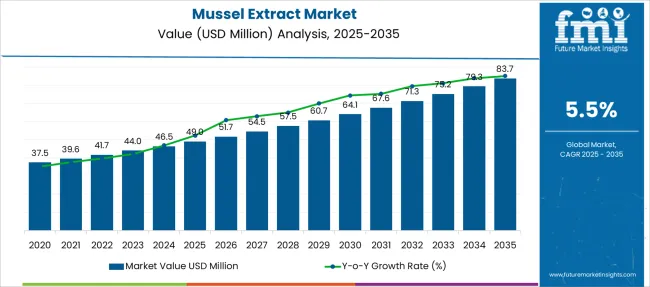
| Metric | Value |
|---|---|
| Mussel Extract Market Estimated Value in (2025 E) | USD 49.0 million |
| Mussel Extract Market Forecast Value in (2035 F) | USD 83.7 million |
| Forecast CAGR (2025 to 2035) | 5.5% |
The mussel extract market is expanding steadily, supported by increasing consumer interest in natural health supplements and alternative therapies. Industry insights reveal that dietary supplements are gaining traction as a preferred option for joint health and inflammation management.
Advances in extraction technologies have improved the bioavailability and purity of mussel extracts, enhancing their appeal among health-conscious consumers. Additionally, growing awareness of marine-based nutraceuticals has broadened the target audience beyond traditional users.
The market is also benefiting from rising demand in functional foods and beverages that incorporate natural ingredients. Distribution networks are evolving, with business-to-business channels playing a significant role in connecting manufacturers to supplement formulators and healthcare providers. The market outlook remains positive as innovations in product formulation and increased focus on preventive healthcare drive growth. Segmental demand is expected to be led by the Dietary Supplement end user, the Liquid form segment, and the B2B distribution channel.
The market is segmented by End User, Form, and Distribution Channel and region. By End User, the market is divided into Dietary Supplement, Biopharmaceuticals, Cosmetics and Personal Care, Pet Food, Veterinary Medicines, and Processed Food. In terms of Form, the market is classified into Liquid, Powder, and Paste. Based on Distribution Channel, the market is segmented into B2B, B2C, Modern Trade, Convenience Store, Specialty Store, Departmental Store, and Others. Regionally, the market is classified into North America, Latin America, Western Europe, Eastern Europe, Balkan & Baltic Countries, Russia & Belarus, Central Asia, East Asia, South Asia & Pacific, and the Middle East & Africa.
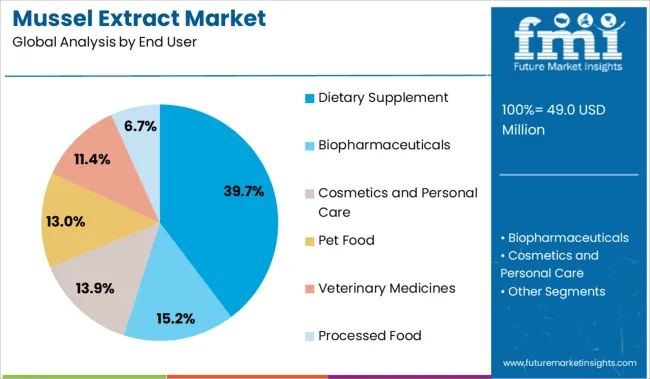
The Dietary Supplement segment is projected to contribute 39.7% of the mussel extract market revenue in 2025, holding the leading position among end users. Growth of this segment has been driven by consumer preference for natural products that support joint and overall health.
Dietary supplements offer convenience and are widely accepted for managing chronic conditions without prescription medications. Health trends emphasizing holistic and preventive care have increased consumer adoption of marine-based supplements like mussel extract.
Additionally, enhanced product efficacy through refined extraction processes has bolstered consumer confidence. The Dietary Supplement segment benefits from established regulatory frameworks that facilitate market entry and consumer trust. As public interest in natural wellness products continues to grow, this segment is expected to maintain its leadership.
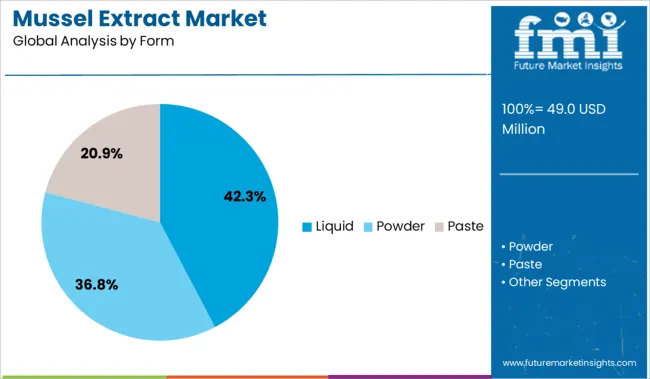
The Liquid form segment is expected to hold 42.3% of the mussel extract market revenue in 2025, securing its status as the leading product form. Liquid mussel extracts offer advantages such as ease of absorption, flexible dosing, and suitability for incorporation into various delivery formats.
Consumers have shown a preference for liquid supplements due to faster bioavailability compared to capsules or powders. Manufacturers have responded by developing convenient and palatable liquid formulations that cater to diverse consumer preferences.
Furthermore, liquid forms facilitate combination with other health ingredients, expanding product applications. The growing popularity of liquid nutraceuticals in global markets supports continued growth for this segment.
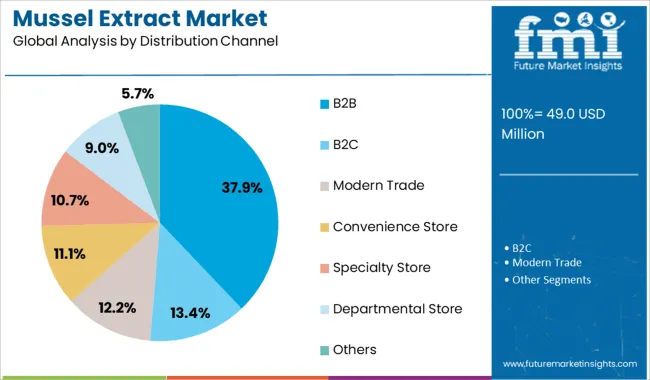
The B2B distribution channel is projected to account for 37.9% of the mussel extract market revenue in 2025, leading the distribution segments. This channel has expanded due to strong demand from dietary supplement manufacturers, functional food companies, and pharmaceutical firms seeking high-quality mussel extract ingredients.
B2B partnerships enable bulk purchasing, customization, and formulation flexibility, which appeal to product developers and contract manufacturers. Additionally, B2B channels facilitate compliance with quality standards and supply chain transparency, which are critical in nutraceutical sourcing.
As the market for natural health ingredients grows, B2B distribution is expected to maintain its pivotal role in bringing mussel extract to various end-use products.
The mussel extract market has received a lot of traction in the industry.
Whether it's seafood or supplements, mussels are popular around the world. With more and more health concerns such as arthritis and bone diseases, consumers are moving towards health benefits from foods such as mussel extract, which has the ability to improve nerve cell function, increase bone and tissue sensitivity, and is included in products such as supplement immunity boosters and nutritional supplements, these factors, in turn, are boosting the mussel extract market growth.
As a result of increased pollution resulting in hazardous work environments and a hectic work-life schedule, and the consumption of tobacco and alcohol, infertility is increasing in both women and men. Mussels also contribute to boosting immunity in consumers, bringing higher demand to the mussel extract market. Due to the health benefits of mussel extract and consumers' demand, there is a growing number of manufacturers using mussel extract in their products.
Higher demand for mussel extract exists in the animal feed industry to enhance the nutritional content of the animal feed. There are a lot of opportunities in the mussel extract market, but the manufacturer should understand the systemic investment budget together with proper planning, for example, purchasing mussels from aquaculture vendors at a cheaper rate and paying GST before shipping to prevent heavy customs duty.
In order to stay relevant in the market, new players need to enter the market with a challenging price rate. Players should have the maximum outsourcing knowledge in order to generate sales of mussel extract as an ingredient to other corresponding manufacturers at a low rate while maintaining that same or better quality than other competitors.
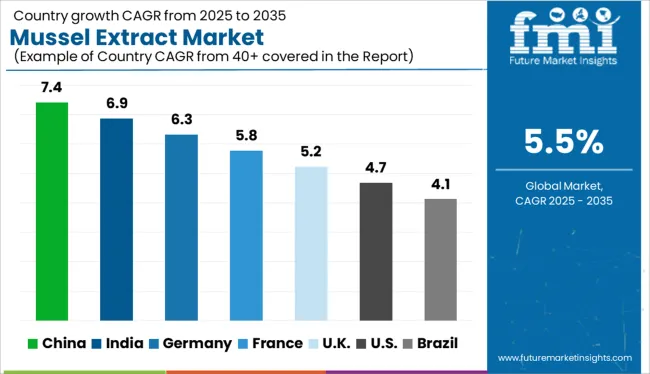
The use of mussel extract has been shown to boost fertility and immune power in consumers, hence, triggering the demand for mussel extract among manufacturers. This has led to the mushroom extract market booming, with many manufacturers already using mussel extract for their products based on consumers' and health benefits.
In 2020, the Asia Pacific held the top market position and was expected to maintain that position throughout the forecast years, owing to the high product demand for mussel extract stemming from the increasing target population in the region. This product is primarily used in treating rheumatoid arthritis and joint-related conditions. Additionally, the global cosmetic market is predicted to benefit from the rapid expansion of the cosmetics and personal care industry, especially in South Korea.
It is expected, however, that Europe will witness the highest growth rate in the mussel extract market from 2020 to 2025 due to an increasing population and increased health consciousness. In addition, Britain is the second-largest producer of live and frozen mussels in this region, while France accounts for the largest imports.
Accordingly, in April 2014, the European Commission of the Common Fisheries Policy Reform and Strategic Guidelines passed a policy with the aim of promoting the aquaculture business in Europe. This will contribute to the rapid expansion of the aquaculture sector in Nordic and English countries and the growth of the mussel extract market regionally.
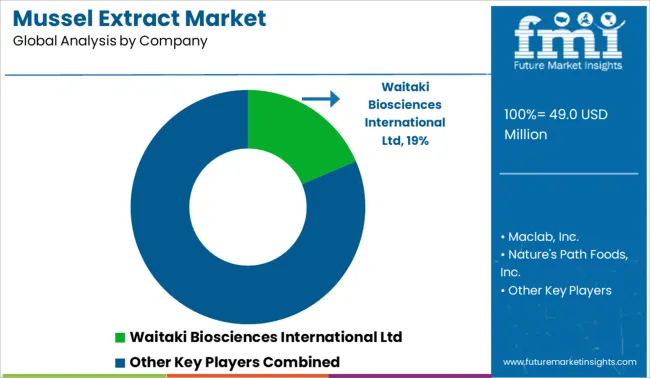
Some of the leading companies operating in the global mussel extract market include Waitaki Biosciences International Ltd., Maclab, Inc., Nature's Path Foods, Inc., Great HealthWorks Inc., and Navchetana Kendra Agra.
They are also seeking to expand their portfolios and create innovative products to increase the mussel extract market share. The companies are focusing on entering newer markets to increase product sales.
A company named Korure Ltd expanded its market in China in 2020 by providing anti-inflammatory phospholipid extract products to the country. Sanford Health launched a range of nutraceutical products in November of the same year.
Aroma New Zealand uses Flash-drying technology to dehydrate heat-sensitive products such as slurries, bioactive proteins, granules, and powders. It permits high temperatures and ensures the highest quality of the final product. This technology allows the formulation of GlycOmega mussel powder in just 5 minutes with no loss of Omega-3 lipids and bioactive proteins, propelling the growth objectives of the global mussel extract market.
| Report Attribute | Details |
|---|---|
| Growth Rate | CAGR of 5.5% from 2025 to 2035 |
| Base Year for Estimation | 2024 |
| Historical Data | 2020 to 2024 |
| Forecast Period | 2025 to 2035 |
| Quantitative Units | Revenue in USD Billion, Volume in Kilotons, and CAGR from 2025 to 2035 |
| Report Coverage | Revenue Forecast, Volume Forecast, Company Ranking, Competitive Landscape, Growth Factors, Trends, and Pricing Analysis |
| Segments Covered | End User, Form, Distribution Channels |
| Regions Covered | North America; Latin America; Europe; East Asia; South Asia; Oceania; Middle East and Africa |
| Key Countries Profiled | USA, Canada, Brazil, Mexico, Germany, United Kingdom, France, Spain, Italy, Russia, Poland, Australia, New Zealand, China, India, Japan, South Korea, Thailand, Malaysia, Vietnam, Indonesia, GCC Countries, Turkey, South Africa, North Africa |
| Key Companies Profiled | Waitaki Biosciences International Ltd; Maclab, Inc.; Nature's Path Foods, Inc.; Great HealthWorks Inc.; Navchetana Kendra Agra. |
| Customization | Available Upon Request |
The global mussel extract market is estimated to be valued at USD 49.0 million in 2025.
The market size for the mussel extract market is projected to reach USD 83.7 million by 2035.
The mussel extract market is expected to grow at a 5.5% CAGR between 2025 and 2035.
The key product types in mussel extract market are dietary supplement, biopharmaceuticals, cosmetics and personal care, pet food, veterinary medicines and processed food.
In terms of form, liquid segment to command 42.3% share in the mussel extract market in 2025.






Our Research Products

The "Full Research Suite" delivers actionable market intel, deep dives on markets or technologies, so clients act faster, cut risk, and unlock growth.

The Leaderboard benchmarks and ranks top vendors, classifying them as Established Leaders, Leading Challengers, or Disruptors & Challengers.

Locates where complements amplify value and substitutes erode it, forecasting net impact by horizon

We deliver granular, decision-grade intel: market sizing, 5-year forecasts, pricing, adoption, usage, revenue, and operational KPIs—plus competitor tracking, regulation, and value chains—across 60 countries broadly.

Spot the shifts before they hit your P&L. We track inflection points, adoption curves, pricing moves, and ecosystem plays to show where demand is heading, why it is changing, and what to do next across high-growth markets and disruptive tech

Real-time reads of user behavior. We track shifting priorities, perceptions of today’s and next-gen services, and provider experience, then pace how fast tech moves from trial to adoption, blending buyer, consumer, and channel inputs with social signals (#WhySwitch, #UX).

Partner with our analyst team to build a custom report designed around your business priorities. From analysing market trends to assessing competitors or crafting bespoke datasets, we tailor insights to your needs.
Supplier Intelligence
Discovery & Profiling
Capacity & Footprint
Performance & Risk
Compliance & Governance
Commercial Readiness
Who Supplies Whom
Scorecards & Shortlists
Playbooks & Docs
Category Intelligence
Definition & Scope
Demand & Use Cases
Cost Drivers
Market Structure
Supply Chain Map
Trade & Policy
Operating Norms
Deliverables
Buyer Intelligence
Account Basics
Spend & Scope
Procurement Model
Vendor Requirements
Terms & Policies
Entry Strategy
Pain Points & Triggers
Outputs
Pricing Analysis
Benchmarks
Trends
Should-Cost
Indexation
Landed Cost
Commercial Terms
Deliverables
Brand Analysis
Positioning & Value Prop
Share & Presence
Customer Evidence
Go-to-Market
Digital & Reputation
Compliance & Trust
KPIs & Gaps
Outputs
Full Research Suite comprises of:
Market outlook & trends analysis
Interviews & case studies
Strategic recommendations
Vendor profiles & capabilities analysis
5-year forecasts
8 regions and 60+ country-level data splits
Market segment data splits
12 months of continuous data updates
DELIVERED AS:
PDF EXCEL ONLINE
Mussel Oils Market Size and Share Forecast Outlook 2025 to 2035
Extraction Kits Market Analysis - Size, Share, and Forecast Outlook 2025 to 2035
Analysis and Growth Projections for Mussel Business
Extracts and Distillates Market
Sage Extract Market Size and Share Forecast Outlook 2025 to 2035
Fume Extractor Market Size and Share Forecast Outlook 2025 to 2035
Meat Extracts Market Size and Share Forecast Outlook 2025 to 2035
Kale Extract Skincare Market Size and Share Forecast Outlook 2025 to 2035
Wine Extract Market Size and Share Forecast Outlook 2025 to 2035
Amla Extract Market Analysis - Size, Share, and Forecast Outlook 2025 to 2035
Dust Extractor Market Growth – Trends & Forecast 2025 to 2035
Data Extraction Software Market
Lipid Extraction Kit Market Size and Share Forecast Outlook 2025 to 2035
Peony Extract Brightening Creams Market Analysis - Size, Share, and Forecast Outlook 2025 to 2035
Peony Extracts for Brightening Market Size and Share Forecast Outlook 2025 to 2035
Algae Extracts Market Size and Share Forecast Outlook 2025 to 2035
Juice Extraction Equipment Market Size and Share Forecast Outlook 2025 to 2035
Yucca Extract Market Size and Share Forecast Outlook 2025 to 2035
Maple Extracts Market Size and Share Forecast Outlook 2025 to 2035
Yeast Extract Market Analysis - Size, Share, and Forecast Outlook 2025 to 2035

Thank you!
You will receive an email from our Business Development Manager. Please be sure to check your SPAM/JUNK folder too.
Chat With
MaRIA